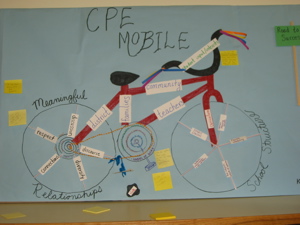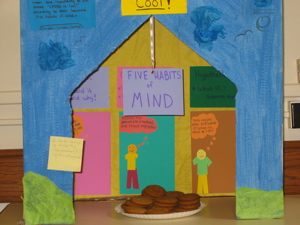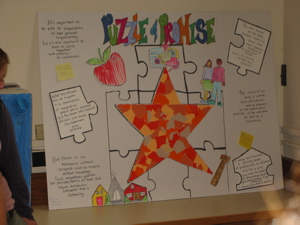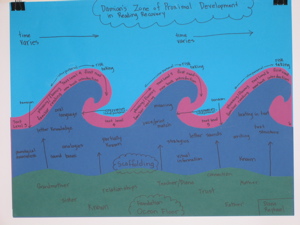




Posted: June 19th, 2006 by Charles Rathbone
| Needs
Improvement |
Good | Excellent | |
| Criteria | |||
| Ed. Psych.
Areas (1) |
|
|
|
| Area of Interest (2) |
|
|
|
| Findings
(3) |
|
|
|
| Conclusions
(4) |
|
|
|
| Project
Presentation (5) |
|
|
|
Posted: June 19th, 2006 by Charles Rathbone
| Needs
Improvement |
Good | Excellent | |
| Course
Requirements |
|||
| Studenting |
|
|
|
| Nightly
Readings |
|
|
|
| Personal
Project |
|
|
|
| Reflective
Presentation |
|
|
|
Posted: June 18th, 2006 by Charles Rathbone
Studenting 20%
1. Come to class each day. If you know you aren’t going to be able to attend, please let me know at least 24hrs. before hand.
2. Do the readings. Do the reflections. Take manageable chunks and do them well. “Do” = read, think, connect, share, understand. Use specific references to texts.
3. Know your own expertise. Contribute to group discussions. Value the expertise of others.
4. Participate in class discussions and class comments. No one is as smart as all of us are together. Listen, question, reflect, share.
Nightly Readings 20%
1. Read assigned readings each night.
2. Choose a section from one of the readings to focus upon. Write out (a) what it was about that section that caught your eye, (b) why, (c) connections across readings, and (d) connections to areas the group has been discussing. Length = 250-350 words. Enter in webCT discussion board.
3. Share your insights with your Synthesis group.
4. The group should be prepared to report back to the larger group any particularly interesting aspects of your discussion that you think the rest of us might find interesting.
5. Please use the roles of facilitator, recorder, reporter, and timekeeper to keep your discussion focused and productive.
Personal Project 40%
Identify an interest area that will strengthen your professional work. Research the area. Prepare a report that meets the following criteria.
1. Identify areas of educational psychology that inform the report.
2a. Identify your area of interest.
2b. Identify why it was chosen.
2c. Identify what you want to find out. Be behaviorally specific.
3a. Summarize what you found out.
3b. Include information from different vantage points if possible.
3c. Seek other sources besides course materials – maximum of 4 including one written. Cite sources using footnotes.
4. Conclude in at least two ways: a) an explanation of how where you ended up is different from where you thought you’d end up, and b) specific statements about how your “work” might shift as a result of what you have learned.
5. Present your project to a group: fifteen minutes, one page overview handout for everyone.
Note: The final form of this project need not be written. It could be reported and presented in a form of your choice eg. powerpoint, visual display, iMovie, oral report with notes plus visual supports, etc.
Reflective Presentation: Vygotsky or Meier or both 10%
1. poster format
2. focuses on text that resonates with you
3. shows connections to your own prior knowledge
4. visually communicates how your personal/professional understanding has been deepened through the reading
5. may be done with partner(s)
You can see several examples from last summer under the resource category.
Blog Commentary 10%
Please set yourself a goal of commenting on at least three of our classes. You can do this in the “Comment” category by clicking on “comment” to the lead statement I will put in there after every day’s class.
Posted: June 17th, 2006 by Charles Rathbone
June 26th – July 7th, 2006
800am-100pm
426 Waterman

Instructor: Charles Rathbone, Ph.D.
Office Phone: 656-4578
Department Phone: 656-3356 (Karen Orr)
webCT: https://www.uvm.edu/webct/
E-mail: charles.rathbone@uvm.edu
Blog: http://crathbon.blog.uvm.edu/edpsychsummer06
Sydney scopp@uvm.edu
Ellen eparisea@uvm.edu
Kristen kristen.courcelle@uvm.edu
Darcie roastbeef78@yahoo.com
Haley hkeene@uvm.edu
Jess jschech2@uvm.edu
Gavin gkwallac@uvm.edu
Brooke ssummerv@uvm.edu
INTRODUCTION
This is a seminar in educational psychology. The dictionary tells us a seminar is:
• a meeting of university students for study or discussion, and/or
• a course of specialized study under faculty supervision, in which ideas, approaches, and advances are regularly shared among participants.
Process
A seminar should be a bounded, free flowing, ongoing, academic discussion among scholars: thoughtful, risk taking, productive, useful, and above all, engaging. I would like you to think about your participation in this way. Listen to others, own your thoughts, challenge and let yourself be challenged. Let’s try to keep it real. We will work in whole class settings as well as small groups. Don’t hide. Be respectful to each other. Listen. Offer your own expertise. We can be a whole lot smarter together than any one of us can be separately. I will structure the class so there are regularly occurring variations in class activity, just to keep us moving and active.
My role as a teacher. There are several areas I think you should know about Educational Psychology and I will make sure this exposure occurs. It’s important that you know something about the scope of the discipline, for example. It’s important that you know some of the good research that’s available to you. It’s important that your “clients” benefit as a result of what happens here. It’s also important that we better understand our present by connecting to the good “stuff” of the past. I will make sure this happens to the best of my skills and knowledge.
But mostly, my intention is that you use this seminar to make you a more powerful educator. Like most teachers, I want your exit to be accompanied by a certainty that your time in class was productive. I will support your inquiry by offering what I know to the group and to you individually. I will try to help us challenge each other with what we know and what we are learning. We will be an enormously diverse group in terms of what we know and are able to do as teacher-scholars. Some of us are just starting and can count on two hands the number of times we’ve been in front of children and youth as “teacher.” Others of us would need hundreds of hands to accomplish the same count. I will work hard to make our time worthwhile. I want you to do the same. Adapt the format to fit your needs. I can change the structure of the course when different approaches are called for. Let’s make it work for us. That is all our responsibility.
Goals
By the end of the seminar, my hope is that each of you have been able to:
1. focus your study of Educational Psychology to become more “expert” in an area of teaching and learning that is significant to you;
2. articulate with specificity what you have learned from classmates’ practice and study; and
3. demonstrate that you have deepened your knowledge of and capacity to apply the work of seminal thinkers in the psychology of teaching, learning, and schooling as practiced in our diverse, multicultural society.
Grading
I will employ a rubric to arrive at a grade for each course participant. Grading is at best, a subjective process even with attempts to objectify the process. The course rubric (in the “rubric” folder) is my attempt to be clear about the required elements of the course.
Texts
Meier, D. (2002.) The Power Of Their Ideas. ed.2. Boston: Beacon Press. ($14)
Wink, J. & Putney, L. (2002.)A Vision of Vygotsky.Boston: Allyn and Bacon. ($41)
Recommended Viewing and Reading
Edutopia WebSite. Multimedia resource for innovative, successful, and ongoing educational practice.
Bransford, K. Brown, A. & Cocking, R. Eds. (1999.) How People Learn. Washington, DC: National Research Council. Generally recognized to the the latest and best compilation of research relative to learning and schooling.
WGBH Webcasts. Features Webcasts of well known educators (Howard Gardner, Deborah Meier, Herbert Ginsberg, Nel Noddings, …) discussing a full range of topics related to learning, schooling, public policy making, teaching, civil rights in education, etc.)